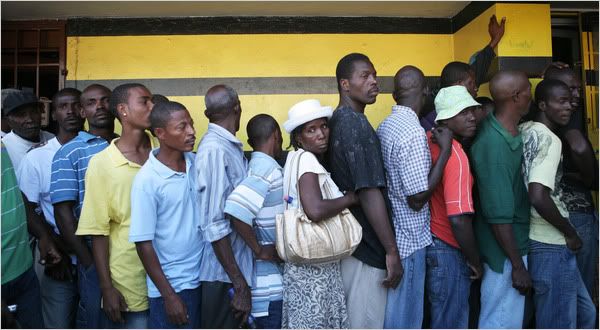
Customers waited in line outside a local money transfer office in Port-au-Prince on Monday.
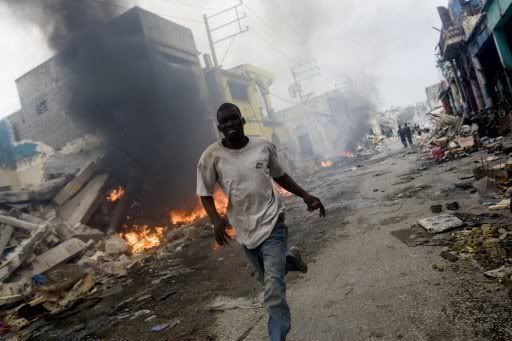
Haitian authorities are struggling to stop the looting in Port-au-Prince

World rallies round earthquake victims
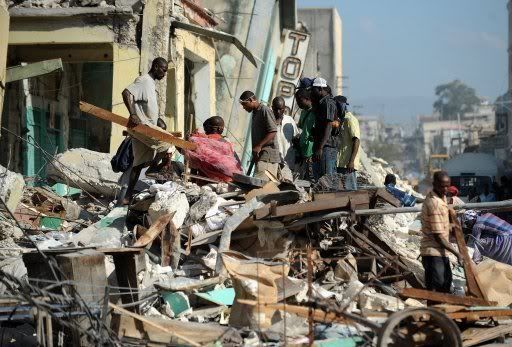
A million were left homeless by the devastating earthquake
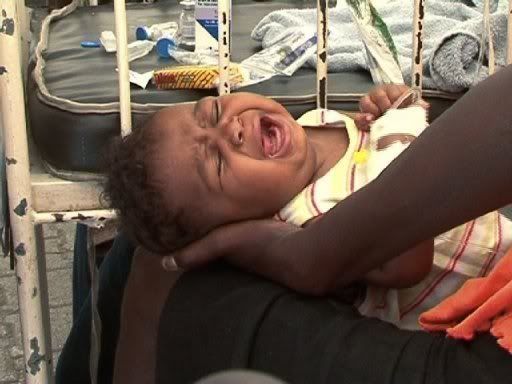
Quake trauma sees mothers' milk run dry.
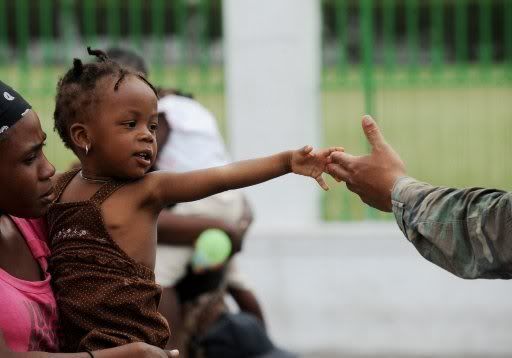
The death toll has risen to 150,000
Thousands of Haitians lined up at money transfer offices here on Tuesday, crowding windows and arguing with the police as they waited as long as 10 hours to collect small cash infusions wired from relatives abroad.
Haitian government officials said they were still trying to determine how much money was pouring in, but after two weeks without remittances because of the earthquake, there appeared to be a significant spike, which they welcomed.
“In Boston, Chicago, Miami and New York, Haitian Americans are helping with their money and their time,” said Elisabeth Delatour Préval, Haiti’s first lady. “They are shocked with what has happened to us.”
Even without an earthquake, two weeks without money from abroad would push many families closer to destitution. Only a small minority in Haiti, the poorest country in the Western Hemisphere, have enough money for a bank account. And since the 1990s, the Haitian economy has turned increasingly reliant on cash wire transfers sent to relatives by the one to two million Haitians who have left for the United States, the Dominican Republic and other countries.
The World Bank has estimated that remittances make up as much as 30 percent of the country’s gross domestic product, triple the level as in 1998, and more than twice the earnings from exports.
Each year, Haitians abroad send back more than $1.5 billion, and in small amounts: most families receive about $150 a month, according to one World Bank report.
The money is usually used for basic necessities, and in the aftermath of the catastrophic earthquake on Jan. 12, the need has increased along with the wait times and the tension.
There simply are not enough open offices. Although some companies have relaxed identification rules to expedite the process, limited electricity and access to cash, along with collapsed buildings, have kept most offices from reopening. MoneyGram International said 40 of its 130 money-transfer agents had reopened, but only 8 of those were in or around Port-au-Prince.
The results have been crowds and complaints.
At a C.A.M. money transfer office in the city’s Nazon section on Tuesday afternoon, at least 300 people, in two lines running in opposite directions on a busy street, shoved, shouted and tried to stay patient.
Natasha George, 29, said she had been there since 3 a.m. waiting for money from her brother, who works at a money transfer office in New York. She had no idea how much cash was coming, but she knew it would not be enough: it had to be shared among her family of eight.
Bernadette Norbrum, 38, stood on the opposite line, shifting from foot to foot, and looking angry. She said she had come from a neighborhood on the city’s edge, arriving in the dark at 4 a.m. She still had a long way to go — about 50 people stood in front of her. And when the police walked someone closer to the door, she shouted in outrage, tossing her hands in the air. “They’re just helping their friends and family,” she said. “Or maybe they’re getting paid.”
With each passing minute, she became more anxious. She was waiting for $70 from a sister in Miami, whose 18-year-old daughter was in a local hospital, awaiting a prescription. Ms. Norbrum said she had already seen another sister die after the earthquake because she did not have money for treatment.
“The problem is, I lost someone already because I couldn’t get her medication,” Ms. Norbrum said. “Now I might lose another because of the delay.”
Throughout the line in Nazon, and others throughout the city, the demands and frustration have been expanding ever since the first money transfer offices reopened a few days ago.
At another C.A.M. office on Monday, there were hundreds of people jockeying to get inside, as Haitian police officers walked a select few to the front. The crowd roared with outrage, to no avail, and those who exited brought forth another complaint. They said the transfer company was charging them a “disaster fee” of 10 percent.
“They are stealing from us and I need it badly,” said Louise Patricia Saint Rose, in her third day of waiting in line for money from her husband in New Jersey. “My daughter was injured. We’re sleeping in the street — I need to buy water and food.”
Elsewhere, the long lines held women with bandaged legs, wincing in pain; Haitians of all ages squeezed together from surging crowds behind them and mothers praying that their sons had sent $100 not $40.
Many were dealing with both personal and economic loss. At a Western Union office on the airport road, Chlony Jean, 33, a taxi driver who twirled his beard and spoke slowly like a philosopher, said he had not worked in 15 days because his company’s employees were all killed in the earthquake. He escaped unharmed, but his daughter did not. She was only 11, named Daeshley, and she died when her school collapsed. Mr. Jean looked away. That was all he could say about her.
“It’s just to buy food,” he said of the money he planned to collect. “It’s for the basic things.”
No respite for Haiti amid fresh aftershocks
Two new aftershocks rattled weary Haitians on Tuesday, as top US officials defended the huge American military-led aid operation from criticisms of being too heavy-handed.
"We just can't get used to these quakes. Each aftershock is terrifying and everyone is afraid," trader Edison Constant said after the aftershocks struck in quick succession around dawn, two weeks after the quake.
"I hid under my bed," added iron merchant Julien Louis, exhausted by a stream of some 50 aftershocks since the devastating 7.0-magnitude quake on January 12.
The US Geological Survey, which warned the Caribbean nation could be feeling aftershocks for the next 30 days, measured the second tremor at 4.4.
But for the traumatized people left homeless, hungry and destitute each new quake is a fresh reminder of the terrifying minute two weeks ago when the earth shook, destroying their lives.
Haitian leaders say the earthquake killed 150,000 people and left a million homeless with hundreds of thousands now dependent on handouts from a massive aid relief operation and living in makeshift camps.
US Secretary of State Hillary Clinton defended the US operation in Haiti from criticisms that it lacked leadership and had been too heavy-handed in the immediate chaotic aftermath of the quake.
"I deeply resent those who attack our country, the generosity of our people and the leadership of our president in trying to respond to historically disastrous conditions after the earthquake," Clinton said.
Some 20,000 US troops have been sent to Haiti to help distribute food and water. They took over control of the damaged airport, but many have remained stationed on offshore ships, including a floating hospital which has been treating scores of injured.
The United States needed to send both troops and civilians "to deliver aid to the Haitians who desperately needed it," Clinton said. "We're scrambling as quick as we could to do everything we needed in the past two weeks."
Leftist Latin American allies Venezuela, Bolivia and Cuba have criticized the United States for its response, accusing US forces of occupying the country rather than helping its people.
A senior Italian official separately deplored a lack of a coordinated international aid effort in Haiti, saying the United States had "too many officers" there and could not find a capable leader.
The international relief effort has indeed struggled to get enough aid into the capital Port-au-Prince and out towards flattened towns near the quake's epicenter, stoking security fears.
Looters were out early Tuesday in the capital's commercial center and appeared to be more organized than in past days, sharing out the tasks of digging through the rubble, equipped with wagons and sledgehammers. Related article: NGO rushes to aid Haiti handicapped
Donor nations and aid organizations have warned rebuilding the impoverished country will take at least a decade.
"Right now, the needs of the people are survival and immediate recovery," said Pierre Kraehenbuehl, director of operations at the International Committee of the Red Cross.
Next comes the phase of long-term reconstruction, he told foreign media in Tokyo. "This is going to be more than 10 years of efforts."
And Haitians, who lived with decades of political upheaval and bloodshed, remain fearful that the new-found international interest in their plight could soon fade.
"The West has come to help us. It is extraordinary, but it will not last," said Andre Muscadin, an evangelical pastor. "Rather than give us a fish, teach us to catch fish."
Donor countries have agreed to hold a full conference on aid to Haiti at the UN headquarters in New York in March.
Haiti's President Rene Preval urged the world to urgently airlift 200,000 more tents and 36 million ready-to-eat packs before the rainy season starts in May.
Aid organizations fear disease could spread like wildfire if thousands are still living in tent cities when the rains come.
---------
----------
---------
----------
----------
--------





0 comments:
Post a Comment